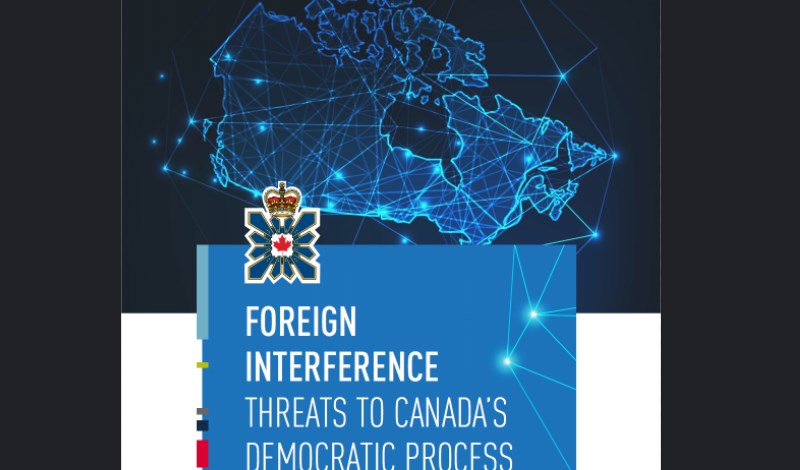Elected officials, their donors, media and the voting public are increasingly subjects of malicious activity by foreign state actors seeking to undermine Canada’s democratic processes to ultimately achieve a degree of control over the country, said Canada’s national security and spy agency in a brief report published Thursday.
The Canadian Security Intelligence Service (CSIS) said these hostile state actors are leveraging multiculturalism as a means to divide Canadians, suppressing voter participation, spreading misinformation and targeting political candidates in order to sway public policy in favour of their interests.
Although CSIS has previously noted China, Iran and Russia form a network of authoritarian state actors committing foreign influence activity, the 17-page report stops short of naming any actors and provides no specific details of its observations, unlike in the United States where, for example, intelligence gathering has shown Russia to be provoking racial tensions, according to the New York Times.
“CSIS continues to observe steady, and in some cases increasing, foreign interference by state actors against Canada. Foreign interference targets all facets of Canadian society. One of the key sectors targeted by this activity is Canada’s democratic institutions and processes.”
Foreign interference and influence can be difficult to spot as it operates outside conventional diplomacy, says CSIS.
Foreign interference is defined as “foreign states, or persons/entities operating on their behalf, attempting to covertly influence decisions, events or outcomes to better suit their strategic interests.”
How is this being done? A number of ways, said CSIS. “State actors may use threats, bribery or blackmail to affect the voting behaviour of individuals inside or outside of communities.”
On the ground, CSIS outlines that actors can elicit information through deception; build long-lasting, deep and even romantic relationships with targeted persons; or set traps, such as having someone knowingly or unwittingly perform corrupt acts, such as illicit financing.
As well, cyber attacks are also a means to compromise or influence Canadians. And, “online influence campaigns attempt to change voter opinions, civil discourse, policymakers’ choices, government relationships, the reputation of politicians and countries, and sow confusion and distrust in Canadian democratic processes and institutions.”
And if that fails, there’s always long-established espionage tactics, says CSIS.
Why is Canada a target?
CSIS states that Canada has an abundance of resources and superior technology. It is a member of the ‘Five Eyes’ security network with Australia, New Zealand, the United Kingdom and the United States. And its open society allows for such exposure.
The immediate goal is to “shape narratives around strategic interests (e.g., artificially create perception of support or divisiveness, gain political favour, etc.)” and to reduce public confidence in the electoral system. Mid-term goals include advancing public policies that align with their national interests while eroding confidence in democracy, such as by discrediting democratic institutions. As CSIS asserts, the long-term objective is to “achieve economic, intelligence, military and geopolitical strategic advantage” over Canada and “disrupt the rules-based international order.”
In B.C. foreign influence is most noticeable by activities coordinated by China’s Chinese Communist Party given the province’s large diaspora of immigrants from China. Canadians of Hong Kong descent have been increasingly protesting Beijing’s crackdown on Hong Kong civil liberties since around 2014, or the Umbrella Movement. Activities of the CCP’s foreign propaganda network, the United Front Work Department, have been well documented in B.C.
A report by Hong Kong-Canadians to the Special Committee on Canada-China Relations on May 31 claims this propaganda effort has been left unchecked by Canadian authorities and, as a result, dissidents of the CCP are reporting more threats to their safety and well-being while a muzzling effect takes greater hold.
“Many are fearful of criticizing the Chinese government as it could cost them career opportunities, business prospects, bar them from returning to PRC-controlled territories and even jeopardize their personal safety and their extended family members,” states the report by the Alliance Canada Hong Kong, titled In Plain Sight: Beijing’s Unrestricted Network of Foreign Influence in Canada.
Richmond-Steveston MP Kenny Chiu, of the opposition Conservatives, proposed a law to register foreign official activity in Canada in April.
A parliamentary intelligence committee report from March 2020 states CSIS’s ability to respond to foreign threats is diminishing as resources are diverted elsewhere, criminal technology becomes more sophisticated and experienced investigators leave.
In its report Thursday, CSIS asks Canadians to be aware of foreign influence and to be aware of protecting your online activity.



